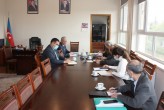
In order to prepare the 3rd period "Environmental Activity Report" of the UN Economic Commission for Europe for the Republic of Azerbaijan for 2010-2020, to assess the progress made in the formation of national policy and the implementation of international environmental commitments, the members of the international team of experts- Elisabeth Clement-Arnold and Chief Biologist of AzeLab LLC, Doctoral student of the Azerbaijan Research Institute of Crop Husbandry, Coordinator of the 14th section of the Environmental Activity Review Gunel Gurbanova visited the Genetic Resources Institute of ANAS on November 17, 2021.
The international team of experts collected information on the achievements of the GEI over the past 10 years for inclusion in the next report for the Republic of Azerbaijan. General Director of the Institute, corresponding member of ANAS Zeynal Akparov informed the international team of experts about the activity of various spheres of the institute. Due to the fact that more than 20% of the country's territory has been occupied by Armenia for more than 30 years, the guests were informed about the achievements of the institute during the occupation, as well as the tension in its activities.
Sowing areas, houses, administrative, farm buildings, seed processing plant, warehouses, totally 1694 hectares of area, livestock barns and shelters, artesian wells, transformer stations, numerous agricultural machinery, tractors, combines, cars and other agro-technical machines and equipment, as well as other fruits, 500 fruit varieties, subtropical plant genotypes, grown in gardens, samples of world and local collection of cereals of the gene pool, rare, unique interspecific, interspecific and natural hybrids, very valuable 200 thousand Elite and primary seed materials of breeding and released varieties grown the fields of husbandry belonging to the Karabakh Scientific Research Base of the Genetic Resources Institute have been under Armenian occupation since 1989 until the victory of the Karabakh war on November 8, 2020.
During this period, forest strips, fruit trees in parks and gardens, more than 20,000 plant genotypes were completely destroyed and burnt by Armenian invaders, irreplaceable subtropical plant genotypes, 200 cattles and 500 sheep, as well as other genetic resources were confiscated or misappropriated. However, despite the occupation of the these lands, it continued to conduct research in the non-occupied territories, created its own new wheat varieties, which were introduced and sown on October 22, 2021 after the Field Seminar organized jointly with the Department of Biological and Medical Sciences of ANAS. The guests were also acquainted with the program and booklets on the Field Workshop. Deputy Director for Scientific Affairs of the Institute, Ph.D in biology Mehrac Abbasov, chief manager, Ph.D in biology Rafail Mahmudov, Head of International and Public Relations Department, Ph.D in biology, Vali Garayev participated in the meeting. In accordance with the law, ensuring the continuous exchange of relevant information between the international team of experts of United Nations Economic Commission for Europe and the International and Public Relations Department of the GRI was considered to be expedient.
© www.genres.az